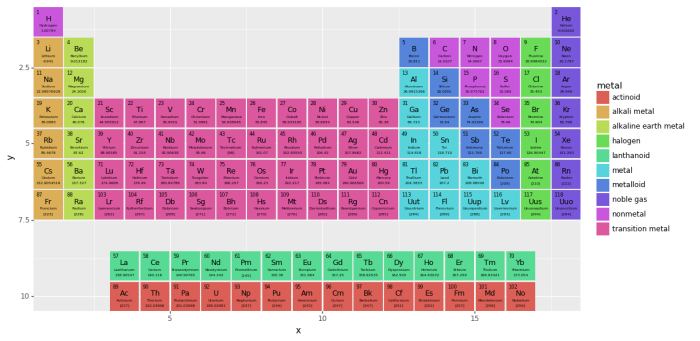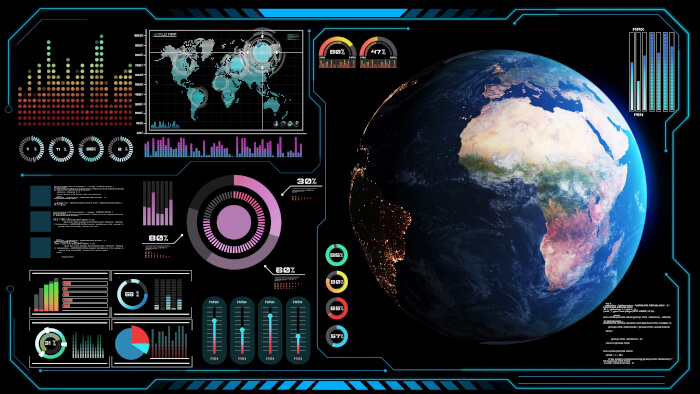plotnine is an implementation of a grammar of graphics in Python. It’s based on ggplot2.
A grammar of graphics is a tool that enables us to concisely describe the components of a graphic. It allows us to move beyond named graphics (e.g., the ‘scatterplot’) and gain insight into the deep structure that underlies statistical graphics. Plotting with a grammar is powerful, it makes custom (and otherwise complex) plots easy to think about and then create, while simple plots remain simple.
The grammar allows users to compose plots by explicitly mapping data to the visual objects that make up the plot.
Features include:
- Similar API to ggplot2.
- Good for custom plots.
plotnine draws upon a number of other open source projects:
- Six – a Python 2 and 3 compatibility library. It provides utility functions for smoothing over the differences between the Python versions with the goal of writing Python code that is compatible on both Python versions.
- matplotlib – for interactive graphing, scientific publishing, user interface development, and web application servers targeting multiple user interfaces and hardcopy output formats.
- NumPy – a general-purpose array-processing package designed to efficiently manipulate large multi-dimensional arrays of arbitrary records without sacrificing too much speed for small multi-dimensional arrays.
- SciPy – a scientific Python library for mathematics, science, and engineering.
- Patsy – a Python library for describing statistical models (especially linear models, or models that have a linear component) and building design matrices.
- Mizani – a scales package for graphics. It’s based on Hadley Wickham’s Scales package.
- Statsmodels – a Python package that provides a complement to SciPy for statistical computations including descriptive statistics and estimation and inference for statistical models.
- pandas – a Python package providing fast, flexible, and expressive data structures designed to make working with structured (tabular, multidimensional, potentially heterogeneous) and time series data both easy and intuitive.
- pytz – a library that enables accurate and cross platform timezone calculations using Python 2.4 or higher.
- dateutil – provides extensions to the standard Python datetime module.
- PyParsing – a Python parsing module that offers an alternative approach to creating and executing simple grammars, vs. the traditional lex/yacc approach, or the use of regular expressions.
- Palettable – a library of color palettes for Python.
- Cycler – composable cycles.
- subprocess32 – a backport of the subprocess standard library module from Python 3.2 & 3.3 for use on Python 2.
- kiwisolver – a fast implementation of the Cassowary constraint solver.
Website: github.com/has2k1/plotnine
Support: Documentation
Developer: Hassan Kibirige
License: GNU General Public License v2.0

plotnine is written in Python. Learn Python with our recommended free books and free tutorials.
Return to Python Visualization Packages
| Popular series | |
|---|---|
| The largest compilation of the best free and open source software in the universe. Each article is supplied with a legendary ratings chart helping you to make informed decisions. | |
| Hundreds of in-depth reviews offering our unbiased and expert opinion on software. We offer helpful and impartial information. | |
| The Big List of Active Linux Distros is a large compilation of actively developed Linux distributions. | |
| Replace proprietary software with open source alternatives: Google, Microsoft, Apple, Adobe, IBM, Autodesk, Oracle, Atlassian, Corel, Cisco, Intuit, SAS, Progress, Salesforce, and Citrix | |
| Awesome Free Linux Games Tools showcases a series of tools that making gaming on Linux a more pleasurable experience. This is a new series. | |
| Machine Learning explores practical applications of machine learning and deep learning from a Linux perspective. We've written reviews of more than 40 self-hosted apps. All are free and open source. | |
| New to Linux? Read our Linux for Starters series. We start right at the basics and teach you everything you need to know to get started with Linux. | |
| Alternatives to popular CLI tools showcases essential tools that are modern replacements for core Linux utilities. | |
| Essential Linux system tools focuses on small, indispensable utilities, useful for system administrators as well as regular users. | |
| Linux utilities to maximise your productivity. Small, indispensable tools, useful for anyone running a Linux machine. | |
| Surveys popular streaming services from a Linux perspective: Amazon Music Unlimited, Myuzi, Spotify, Deezer, Tidal. | |
| Saving Money with Linux looks at how you can reduce your energy bills running Linux. | |
| Home computers became commonplace in the 1980s. Emulate home computers including the Commodore 64, Amiga, Atari ST, ZX81, Amstrad CPC, and ZX Spectrum. | |
| Now and Then examines how promising open source software fared over the years. It can be a bumpy ride. | |
| Linux at Home looks at a range of home activities where Linux can play its part, making the most of our time at home, keeping active and engaged. | |
| Linux Candy reveals the lighter side of Linux. Have some fun and escape from the daily drudgery. | |
| Getting Started with Docker helps you master Docker, a set of platform as a service products that delivers software in packages called containers. | |
| Best Free Android Apps. We showcase free Android apps that are definitely worth downloading. There's a strict eligibility criteria for inclusion in this series. | |
| These best free books accelerate your learning of every programming language. Learn a new language today! | |
| These free tutorials offer the perfect tonic to our free programming books series. | |
| Linux Around The World showcases usergroups that are relevant to Linux enthusiasts. Great ways to meet up with fellow enthusiasts. | |
| Stars and Stripes is an occasional series looking at the impact of Linux in the USA. | |
